Alle Blogbeiträge von Abt Gregory
angezeigt: 1 bis 9 von 9
9 Einträge wurden gefunden
"And so it is Christmas!"
25. Dezember 2012 Gregory
This is now my third Christmas in Dormition (having been here as a guest in 2006) but only my second as a member of the community. Our postulant Benjamin is in a similar situation, having previously experienced Christmas here as a member of our Theological Study Year. But it is a very different thing being right at the heart of the community and taking part in all the preparations within the monastery. It is an exhilarating experience because it is by working and praying together that the community really comes into being.
But it is also a fascinating experience because while on the one hand we are right in the middle of this Oriental culture, living next door to Jews and Muslims, on the other hand we have a real German Christmas with all the trimmings - the trees, the traditional songs and the wonderful German Christmas cooking. So between that and the liturgy it is a fascinating place to be. One doesn't have to be a Germanophile to live here but it certainly helps! I have been one since my first visit to Germany (Aachen and Cologne) in 1994...
Fascinating too is Tabgha, where the brethren are now living in our splendid new monastery and talking about how they can develop the monastic culture of the place in new (and ancient) directions. Last week we had an all-day community meeting there with all of us who are currently in the Holy Land. We also celebrated Prior Elias' 50th birthday. It rained as hard as a winter's day in Ireland - but the difference is that here it stops!
A very strong feature of our Christmas celebrations is the walk to Bethlehem after Midnight Mass, bearing the scroll of our charitable Weihnachtsaktion, which we place in the grotto of the Nativity, before singing Lauds.
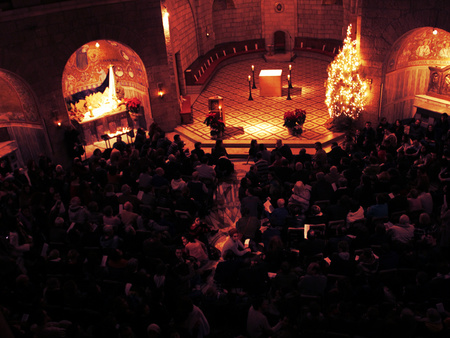 Midnight Mass at Dormition Church
Our traditional Midnight Mass, with our volunteers students and many friends, attracts many Israeli visitors, drawn by the beauty of the liturgy and particularly its German ethos. That of course means that a large part of our congregation is actually Jewish. Naturally we we ask them to observe the Church's rules about not receiving Holy Communion and they are very respectful of that. They are welcome visitors. Last year, they observed the liturgy with great reverence. They cannot confess with us that Jesus is the Son of God and Messiah but we do well to remember the words of Karl Barth: "The Word was not just made flesh - it was made Jewish flesh." In the birth of the one whom we call "the Christ", we celebrate the incarnation of God in a real, living context, that of his Jewish people, the people of the first and unbreakable covenant with God, the people of Mary and Joseph.
Midnight Mass at Dormition Church
Our traditional Midnight Mass, with our volunteers students and many friends, attracts many Israeli visitors, drawn by the beauty of the liturgy and particularly its German ethos. That of course means that a large part of our congregation is actually Jewish. Naturally we we ask them to observe the Church's rules about not receiving Holy Communion and they are very respectful of that. They are welcome visitors. Last year, they observed the liturgy with great reverence. They cannot confess with us that Jesus is the Son of God and Messiah but we do well to remember the words of Karl Barth: "The Word was not just made flesh - it was made Jewish flesh." In the birth of the one whom we call "the Christ", we celebrate the incarnation of God in a real, living context, that of his Jewish people, the people of the first and unbreakable covenant with God, the people of Mary and Joseph.
As an English pop song for this season enthusiastically declares: "And so it is Christmas!" Or as Pope Leo the Great put it, a bit more more theologically: "The birthday of our Redeemer is the birthday of peace!" It is God's declaration of peace between himself and the world, even if it so often seems that the world is not listening. But here in the monastery we are listening - or at least trying too.
In the peace of Christmas Midnight, we wish you all the blessings of our Savior' coming and we invite you to join us in praying for peace in this land of his birth and throughout the world - "For God so loved the world that he gave his only Son..."
Gloria in excelsis Deo et in terra pax hominibus, bonae voluntatis!
Happy Christmas!
Über Gregory
Longing for the grace of the long-awaited Redeemer
17. Dezember 2012 Gregory
In every Benedictine Abbey, the week before Christmas is very busy, just as it is in most homes. The monks spend a lot of time getting things ready for the coming feasts. But more importantly it is also a time of intense spiritual preparation for the first great feast of this season, that of Christmas itself.
In the western liturgy, these days from the 17th of December onward, are marked especially by the fact that at solemn vespers every evening we sing the great "O Antiphons". During the chanting of Mary's Magnificat, which the antiphons introduce and conclude, the monastery bells are rung and the altar is solemnly incensed.
Each antiphon (a short piece of medieval liturgical poetry, originally written in Latin but here sung in German) addresses Christ using a distinctive title. They move forward from the opening one, "O Sapientia" ("O Wisdom") to the final one, "O Emmanuel". On the 21st, the winter solstice, we cry to him as "O Oriens" ("O Rising Sun"). Thanks to the haunting Gregorian melody, the long drawn out "O" at the beginning, and the final invocation asking Christ to come and enlighten us, the spirit of Advent finds its most perfect expression. All is longing and yearning, imploring for the grace of the long-awaited Redeemer, who, as one Advent prayer puts it, comes to free us from the age-old bondage of sin.
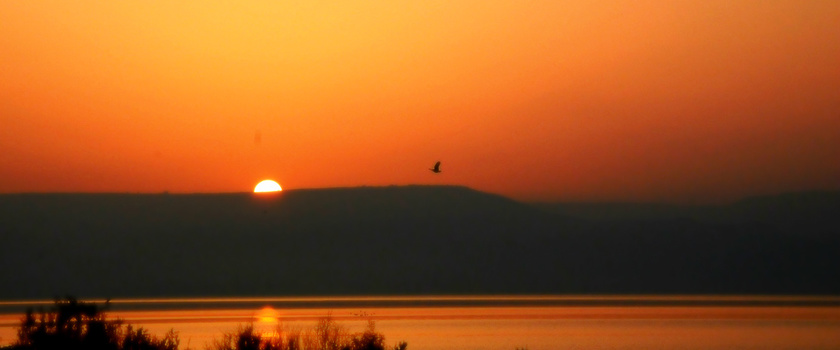 Sunrise at Tabgha
Sunrise at Tabgha
The darkness of the evening in which we sing is a potent reminder of the spiritual darkness enveloping so many areas of the world today - the darkness of the murdered children in America, of the little girls recently blown up in Afghanistan, of the bitter sectarian hatred which still survives in Belfast, of the continuing insecurity in the Middle-East - and of so much suffering, the lot of so many on our planet. In this last week before Christmas we ask God to send the light afresh, the light that according to St. John's Gospel, no darkness can quench, the light of Christ. Maranatha: Come, Lord Jesus!
Über Gregory
About giving cheerful: Our volunteers.
15. Dezember 2012 Gregory
Every monastic community is wider than the monks who actually compose its professed members. Naturally the brethren or sisters who have professed stability to the place constitute its stable core, but around them there are also many people connected to the community and its work. We think of our Oblates, and our wider Freundeskreis; then of our students; and also of all the people who work for us.
But an absolutely indispensable group of people who make up our wider community is that of our volunteers, mostly German-speakers of various ages. Organised by Fr. Jonas, they spend longer or shorter periods of time with us and help in the running of the house and its projects. Form the cafeteria to the garden via the shop, their presence is one of the strongest features of life here. In many ways they are the public face of the monastery, quietly doing their work in a dedicated way, here in this great shrine of the Mother of God. Without them, monastic life in Dormition and Tabgha would be much more difficult to organize. Without them, the two place would lack much of their charm and warmth - but also their energy!
St. Paul reminded the Corinthinans that God loves a cheerful giver. In our contemporary culture with its abrasive market economy, so often driven by greed and rampant consumerism, it is inspiring to know that the virtue of generous, selfless, voluntary service has not disappeared. Our volunteers, quietly working here, are a constant reminder of that fact, especially as we draw near to Christmas and Epiphany, the supreme time of gifts and giving.
Über Gregory
"If God would speak then we must be silent."
2. Dezember 2012 Gregory
If God would speak then we must be silent. – These words from the medieval German mystic John Tauler OP, give us a good orientation as we begin again the season of Advent.
Everyone loves Advent, with its special atmosphere characterized by the festive wreath, candles, special Masses, readings from the prophet Isaiah and purple vestments. Yet although it culminates in the great feasts of Christ's birth, manifestation and baptism, and of Mary as Mother of God, its focus in the first two weeks is not at all sentimental. The liturgy's emphasis falls not on the first coming of Christ - that of the babe of Bethlehem - but rather on his second glorious coming, to judge the living and the dead. It is Christ Pantokrator, the Almighty One, the risen Kyrios, whom we celebrate tomorrow and in the next two weeks.
That is why the quotation from Tauler is so important.
 Waken up...
It is a message that the liturgy hammers home. Not only "Wachet auf!" ("Waken up!') but "Shut up!": that is what we are called to do. We need to learn how to cultivate more outer and inner silence, stilling the crowd of words, images and ideas jostling in our minds, so as to attend to the one Word worth hearing, the one God speaks in eternity, the one he spoke in Bethlehem and the one he will speak at the end of the ages - Jesus Christ, the long-awaited Messiah - promised by the prophets, conceived by Mary, acclaimed by John and taken up in glory in his death and resurrection. He alone is the Savior of the world, whose life, teaching, miracles and above all saving passion, opens up for everyone the way of access to God. Advent is a privileged time for listening to his voice.
Waken up...
It is a message that the liturgy hammers home. Not only "Wachet auf!" ("Waken up!') but "Shut up!": that is what we are called to do. We need to learn how to cultivate more outer and inner silence, stilling the crowd of words, images and ideas jostling in our minds, so as to attend to the one Word worth hearing, the one God speaks in eternity, the one he spoke in Bethlehem and the one he will speak at the end of the ages - Jesus Christ, the long-awaited Messiah - promised by the prophets, conceived by Mary, acclaimed by John and taken up in glory in his death and resurrection. He alone is the Savior of the world, whose life, teaching, miracles and above all saving passion, opens up for everyone the way of access to God. Advent is a privileged time for listening to his voice.
Über Gregory
A kingdom of justice, love and peace
25. November 2012 Gregory
Today we are celebrating the Solemnity of Christ as King of the Universe. It is a relatively modern feast. Nowadays one often hears criticism of the liturgical reform initiated by the Second Vatican Council but we must never lose sight of the tremendous benefits that reform brought with it. One of them was surely the upgrading of this feast and its placing at the climax of the liturgical year. It contains some excellent prayers, especially the very fine Preface of the Mass. If we want to know what a true vision of the kingdom of God can be like, there is no better place to begin than here:
...an eternal and universal kingdom,
a kingdom of truth and life,
a kingdom of holiness and grace,
a kingdom of justice, love and peace...
The Gospel for this year, (B), is St John's account of the meeting between Christ and Pontius Pilate, in which Jesus insists that his kingdom is not of this world, but also tells the Roman Governor that he came into the world to bear witness to the truth. We need to remember that the kingdom comes not through our efforts. We do not bring it into being: God does. Our task is to work with him with him in proclaiming his gospel of reconciling love, without ever forgetting that the kingdom is his. That is why we pray every day, in the Lord's Prayer,"Thy kingdom come."
As we approach the end of another liturgical year - the Church's year of grace - this great feast invites us to life up our hearts and hands in prayer for the coming of God's kingdom, and to remember that everything is always brought about by grace - and grace alone.
Über Gregory
...as we forgive those who trespass against us
23. November 2012 Gregory
Like most people who live in community for a long time, St. Benedict knew something about conflict and conflict-resolution. In his chapter (No. IV) in the Rule, called, "The Tools of Good Works", he included two that are very relevant to this matter.
The first is, "Contentionem non amare", which means, "Do not love strife and contention." One can meet people at times who seem to thrive on fighting, who take offence very quickly and seem to find it impossible to let go of a grievance. But the willingness to do that - no matter how hard - is what makes community life (and marriage!) possible.
 light and shadow
Medieval monks often likened a monastery to a return to paradise, but in truth, if the spirit of contention takes over it could become a kind of purgatory on earth. For that reason the Rule prescribes the recitation of the Lord's Prayer at the end of Vespers every evening: "Forgive us our trespasses as we forgive those who trespass against us."
light and shadow
Medieval monks often likened a monastery to a return to paradise, but in truth, if the spirit of contention takes over it could become a kind of purgatory on earth. For that reason the Rule prescribes the recitation of the Lord's Prayer at the end of Vespers every evening: "Forgive us our trespasses as we forgive those who trespass against us."
Benedict's other tool is the admonition: "Do not make a false peace!" It can be better to live for a while with the tension of discord rather than just sweeping everything under the carpet and pretending that it is all OK. Peace, like every other desirable human condition, has to be based on truth. No one ever said that life together in community is always nice or easy. It is a demanding task to live together and to carry out the precepts of the Gospel.
But as they say during the celebration of the Byzantine liturgy: "Christ is in our midst!", and he is the lasting bond of peace.
Über Gregory
The silencing of weapons...
22. November 2012 Gregory
Last night we prayed for peace. Our students never fail to amaze me: as if out of the blue they sang a complex and beautiful piece by Mendelssohn, having had perhaps only a day to prepare it!
But what struck me most was a German hymn I had not heard before, from Paul Gerhardt, one of the greatest Protestant hymn writers of the early modern period in Germany. Here are some lines of one of the stanzas, in translation. Naturally they lose their poetic quality but I think they convey a real yearning for peace. Gerhardt after all experienced the terrible wars of religion that marred the history of Central Europe, so he knew what he was talking about:
O that God would declare to us the end of war,
the silencing of weapons
and an end of all unhappiness!
Since last night a fragile peace has descended on this land. We need to go on praying that it will endure. As I said before, a ceasefire is not yet a true peace - but it is at least a necessary start. For real and lasting peace it is not enough just to keep raising our hands to heaven. There was to be concerted, creative, imaginative political action and a corresponding thrust to alleviate social injustice and economic hardship. That at least was our experience in Northern Ireland, where, despite its imperfections and some deplorable on-going violence, the peace process has been largely successful. However for peace to come there has to be a will to achieve it - not just a desire for victory.
 Meer
Meer
Über Gregory
Despair is not an option for Benedictines
20. November 2012 Gregory
Tonight, in the Holy Land, we are all waiting in hope for the good news that a ceasefire will be announced. It has been a distressing week, watching the old wounds of this country bleeding anew and seeing the dead bodies of children carried by their distraught parents.
Tomorrow we will hold a service of the Word with our resident German-speaking theological students, (who represent different Christian traditions), to pray for peace. They are good-natured, generous, intelligent young people, united by their search for God and their enthusiasm to spend time together and with us in this land, where one is constantly reminded of the incarnation of Christ - a place where theology is never just abstract but always clothed in flesh and blood. We will pray together tomorrow in our basilica here at 18.15, Wednesday, the feast of the Presentation of the Holy Mother of God in the Temple.
Some people might feel that if a ceasefire is actually achieved tonight such a service might be somehow less important...
Not at all! A ceasefire is a very good thing - may it happen! - but it is not really peace. True peace is so much more than the mere absence of conflict. Ceasefire or not, we will be praying for real, long-lasting peace, the only kind that matters - one based on justice, mutual recognition of rights and responsibilities, acknowledgement of past wrongs and real forgiveness. A Utopian vision? Maybe. But despair is not an option for Benedictines. Our Holy Father Saint Benedict tells us after all never to despair of the mercy of God. So join us tomorrow in spirit, wherever you are, in praying for lasting peace in this complex, troubled but wonderful land.
Über Gregory
The prayer of a silent witness
18. November 2012 Gregory
This evening (Saturday) we sang, as usual, our Vigil Office. It is an ancient Christian custom and a strong reminder of the unity of our Sunday worship - from First to Second Vespers via Mass in the morning - all centered on Christ's glorious passing from death to life. After the proclamation of the Gospel (always one of the moving accounts of his resurrection), the Gospel Book is elevated and we sing the following Byzantine chant,
"Now that we have seen the resurrection of Christ,
come let us worship the Holy Lord Jesus,
the only sinless one..."
Then the assembly is blessed with the Gospel Book, a powerful sign of Christ present among us.
It is an interesting choice of words. The great Byzantine monk and mystic, St. Symeon the New Theologian (949-1022), pointed out that we don't just say, "Now that we have believed in Christ's resurrection", but rather, "Now that we have seen his resurrection."
But how have we seen it? After all, nobody actually witnessed it directly. Of course, Mary and the Apostles did meet the risen Jesus after the event. But as for literally seeing the resurrection – only the Father, the Son and the Holy Spirit were the actual witnesses!
There are much deeper ways of seeing though than the merely literal. We do begin by believing in his resurrection. But if we carry out our lectio divina of the Holy Scriptures, if we pray, and especially if we receive the Eucharist regularly, a kind of "inner eye" opens up inside us, the eye of the heart. We begin to perceive spiritually that he is present. We begin to experience him. As the Orthodox Church sings in Lent, "The light of Christ shines on all!" In the darkness of faith, he speaks our name as he spoke to Mary Magdalene in the garden. We realize that he is more than an idea – he is risen.
Yet as I write this tonight, there are not many obvious signs of resurrection in the Holy Land. People are suffering terribly, on both sides of the divide. But in the heart of the Old City stands the silent witness, the empty tomb. "The light of Christ shines on all" sing the Orthodox. Let us repeat a prayer from our western liturgy:
"May the light of Christ, rising in glory, dispel the darkness of our hearts and minds!"
May it dispel all hatred, bitterness and revenge, and usher in the light of love.
Über Gregory
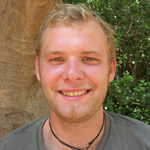 Paul
Paul
Paul Nordhausen-Besalel ist schon etwas in der Welt herumgekommen, bis er nach seinem Pädagogikstudium in Israel landete. Aber er hat sich die Begeisterung eines Kindes bewahrt, wenn er seiner Arbeit und den Menschen, denen er dabei begegnet, entgegentritt. Als Leiter der Begegnungsstätte Beit Noah muss er das auch. – Von einem der schönsten Jobs rund um den See Genezareth berichtet er im Beit Noah-Blog.
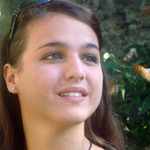 Nina.
Nina.
Nun stehen unsere Füße in deinen Toren, Jerusalem. (Psalm 122,2)
Acht Monate in Jerusalem leben und lernen: Dieser Traum wurde für Nina aus dem Schwabenland wahr.
Sie stammt aus einer württembergischen Kleinstadt bei Esslingen am Neckar. Auch für das Studium der Theologie verschlug es sie an den Neckar, diesmal direkt ans Ufer, nämlich nach Tübingen. Nach vier Semestern dort ist sie nun in Jerusalem, der Heiligen Stadt für Juden, Christen und Muslime.
In dieser Stadt, in der es nichts gibt, was es nicht gibt, macht sie jeden Tag aufs Neue faszinierende wie irritierende Erfahrungen, von denen sie im Studiblog berichtet.
Von pinkfarbenem Blumenkohl, eingelegten Oliven in Plastikeimern, Rolexverkäufern und sonstigen Erlebnissen und Begegnungen im Heiligen Land erzählt sie humorvoll auf ihrem privaten Blog „Nina im Heiligen Land” .
 Lukas (STJ 2012/13)
Lukas (STJ 2012/13)
Lukas Wiesenhütter liebt Humus, Falafel und den Gang durch die Gassen der Jerusalemer Altstadt. Nach sechs Semestern in Freiburg im Breisgau studiert er während der kommenden Monate Theologie an der Dormitio-Abtei. Nebenbei schreibt der 23-Jährige am Blog des Studienjahres mit.
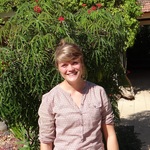 Caroline
Caroline
Caroline ist eine der vier DVHL-Volos, die 2013/14 in Tabgha ihren Dienst machen. Von ihrer Arbeit und ihrem Leben am See berichtet sie in diesem Blog.
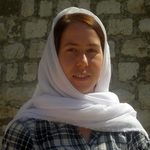 Florence Berg.
Florence Berg.
Florence was raised in Luxembourg, but returned to her native country Germany to take up theological studies in the lovely town of Tübingen, where she soon added a degree in Near Eastern Archeology, simply out of curiosity.
Although in Jerusalem and the entire Holy Land it's very hard NOT to stumble across some archeological remains (and so much more not yet discovered!), she'll also have a close look at living humans.
Greek-catholic nuns and French Dominican friars, Muslims and religious Jews, Christian Palestinians and German fellow students - it's quite unique, so enjoy Florence's reports, impressions and anecdotes!
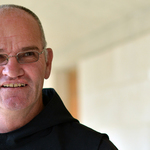 Bruder Franziskus
Bruder Franziskus
Wer Bruder Franziskus einmal in Tabgha erlebt hat, der hat den Eindruck, dass er schon immer da ist: Die Verbundenheit mit diesem sehr besonderen Teil der Schöpfung, die Offenheit für die Menschen und besonders die Nähe zu Jesus, der diesen schönen Ort am See mit den Menschen geteilt hat, machen aus Bruder Franziskus einen echten Tabgha-Mönch.
Auch den Neubau und die Menschen um ihn herum hat er im Blick. Im Bautagebuch erzählt er davon.
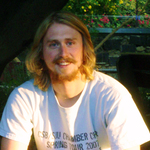 Tony
Tony
Tony (Anthony) Nelson ist von Hause aus Philosoph, d.h. von seinem ersten Studienabschluss her. Den hat er an der St. John's University in Collegeville (Minnesota/USA) gemacht. Das ist bestimmt nicht die schlechteste Voraussetzung für den zweitschönsten Job am See Genezareth: Assistent des Leiters der Begegnungsstätte Beit Noah. Tony, der im Rahmen des Benedictine Volunteer Corps bei uns in Tabgha ist, erzählt von seiner Arbeit im Beit Noah-Blog.
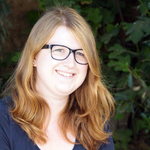 Annika (STJ (2012/13)
Annika (STJ (2012/13)
Annika Schmitz hat ihr Theologiestudium vor sieben Semestern als überzeugte Kölnerin in Freiburg im Breisgau begonnen. Sie hat also einige Erfahrung damit, sich auf fremde Kulturen einzulassen.
Bis Mitte April lebt, studiert und bloggt die 23-Jährige aus Jerusalem.
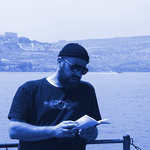 p basilius
p basilius
„Willst du von der Welt was seh’n, musst du in ein Kloster geh’n!“ – Im Gemeinschaftsleben im Kloster mit den Brüdern, mit Gästen, Studierenden und Volontären kann man in der Tat viel von der Welt sehen und erfahren. Und mindestens die halbe Welt kommt nach Jerusalem und Tabgha, weil es sich einfach lohnt... – Aus diesen Welten im und ums Kloster erzählt Pater Basilius, der Prior unserer Teilgemeinschaft in Tabgha.

Mit einer Unterbrechung von etwa eineinhalb Jahren, in denen er im „Haus Jerusalem” lebte, ist Pater Jeremias schon seit über zehn Jahren in Tabgha.
Den Entstehungsprozess des neuen Klosters hat er intensiv miterlebt und geprägt: Bei der Erstellung des Masterplanes, einer Art Bebauungs- und Flächennutzungsplans, in unzähligen Gesprächen mit den Brüdern, den Architekten und den Vertretern des DVHL und in der Begegnung um im Kontakt mit Spendern, die dieses Projekt in so wunderbarer Weise ermöglichen.
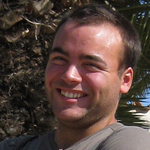 Peter Blattner
Peter Blattner
Peter Blattner gehört zur vierten Generation amerikanischer Volontäre, die uns die Benediktinerhochschule St. John's/Collegeville in Minnesota schickt. Wie auch seine Vorgänger verstärkt er das Beit Noah-Team um Leiter Paul Nordhausen Besalel.
Im Beit Noah-Blog berichtet er, was er auf der und um die Begegnungsstätte so alles erlebt!
 Nancy Rahn.
Nancy Rahn.
Nancy ist Weltenbummlerin und beobachtet gerne Menschen. Dafür ist sie in Jerusalem genau an der richtigen Adresse.
Ursprünglich studiert Nancy im kleinen Tübingen und genießt deshalb den Trubel und das Getümmel in den kleinen und großen Straßen ihrer neuen Heimat auf Zeit.
Von eindrücklichen Erfahrungen, witzigen und nachdenklichen Begegnungen und davon was es heißt, mit einem Haufen ganz unterschiedlicher Menschen zusammen ein dreiviertel Jahr lang das Land der Bibel kennenzulernen, berichtet sie im Studi-Blog.
Weitere Beobachtungen teilt Nancy auf ihrem privaten Blog Nancy auf dem Zion.
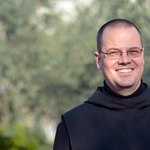 Pater Ralph
Pater Ralph
Spötter behaupten, eine der wichtigsten Beschäftigungen der Benediktinermönche sei es zu bauen. – Das ist genauso böse wie richtig. Denn der Bau eines neuen Klosters in Tabgha ist für unsere Gemeinschaft dort ausgesprochen wichtig, um an diesem beliebten und belebten Pilgerort einen sicheren und geschützten Lebensraum als Mönche zu haben. – Pater Prior Ralphs Tagewerk richtet sich nach den Baumaschinen und Handwerkern, wovon er im „Bautagebuch“ berichtet.
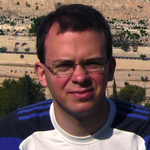 Tobias Weyler.
Tobias Weyler.
Tobias ist gebürtiger Düsseldorfer und Kölner Erzbistumskind. Deshalb lag es nahe, dass er sein Theologiestudium vor zwei Jahren in Bonn begann.
Jerusalem und Israel reizen ihn politisch, sprachlich, kulturell, wissenschaftlich und natürlich religiös. Über seine Erfahrungen und Eindrücke berichtet er hier zusammen mit Nina und Nancy.
Außerdem bloggt Tobias auch unter yerushalayimshelzahav.over-blog.de!
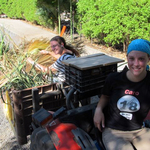 Carolin.
Carolin.
Mein Name ist Carolin Willimsky. Ich bin dieses Jahr (2012/13) Volontärin in Tabgha, dabei werde möglichst regelmäßig diesen Blog schreiben.
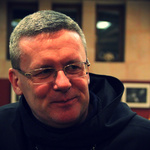 Abbot Gregory
Abbot Gregory
Born and grown up in Belfast Abbot Gregory made, of course, very specific experiences with people of different religions or denominations. It is not only a question of peace or violence, even more it is a process of learning together.
As an Irish monk of a German monastery in the holy city of Jerusalem Abbot Gregory will share his impressions of ever day’s life here in Jerusalem between all those people of various languages, cultures and religions – not always easy people, but interesting people.
 Midnight Mass at Dormition Church
Our traditional Midnight Mass, with our volunteers students and many friends, attracts many Israeli visitors, drawn by the beauty of the liturgy and particularly its German ethos. That of course means that a large part of our congregation is actually Jewish. Naturally we we ask them to observe the Church's rules about not receiving Holy Communion and they are very respectful of that. They are welcome visitors. Last year, they observed the liturgy with great reverence. They cannot confess with us that Jesus is the Son of God and Messiah but we do well to remember the words of Karl Barth: "The Word was not just made flesh - it was made Jewish flesh." In the birth of the one whom we call "the Christ", we celebrate the incarnation of God in a real, living context, that of his Jewish people, the people of the first and unbreakable covenant with God, the people of Mary and Joseph.
Midnight Mass at Dormition Church
Our traditional Midnight Mass, with our volunteers students and many friends, attracts many Israeli visitors, drawn by the beauty of the liturgy and particularly its German ethos. That of course means that a large part of our congregation is actually Jewish. Naturally we we ask them to observe the Church's rules about not receiving Holy Communion and they are very respectful of that. They are welcome visitors. Last year, they observed the liturgy with great reverence. They cannot confess with us that Jesus is the Son of God and Messiah but we do well to remember the words of Karl Barth: "The Word was not just made flesh - it was made Jewish flesh." In the birth of the one whom we call "the Christ", we celebrate the incarnation of God in a real, living context, that of his Jewish people, the people of the first and unbreakable covenant with God, the people of Mary and Joseph. 


















